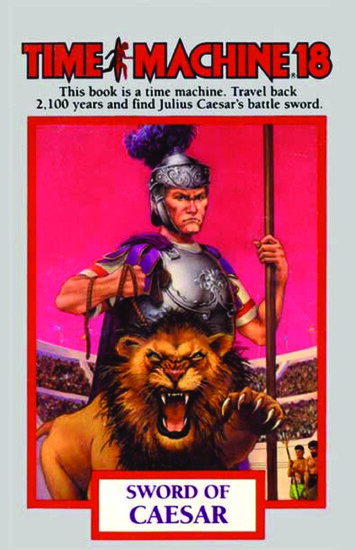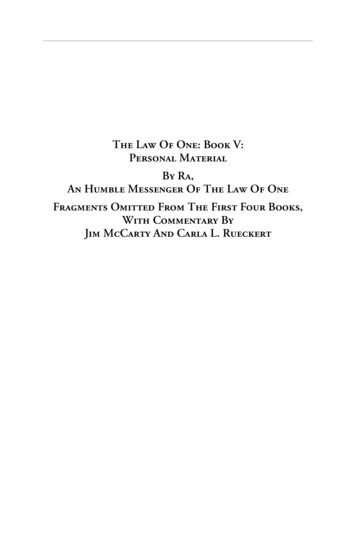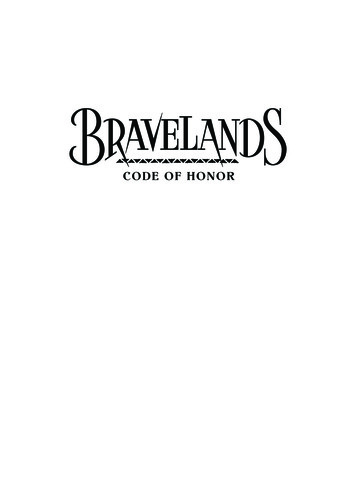
Transcription
This book isyour passportinto time.Can you survive inthe Roman Empire?Turn the page tofind out.
SWORD OFCAESARRobin and Bruce Stevensonillustrated by Richard HescoxA Byron Preiss Book
For AbigailCopyright @ 2001, 1987 by Byron Preiss Visual Publications“Time Machine” is a registered trademark ofByron Preiss Visual Publications, Inc. Registered in theU.S. Patent and Trademark office.Cover painting by Richard Hescox.Cover design by Alex Jay.An ipicturebooks.com ebookipicturebooks.com24 West 25th St., 11th fl.Y, NY 10010The ipicturebooks World Wide Web Site Address is:http://www.ipicturebooks.comOriginal ISBN: 0-553-26531-8eISBN: 1-59019-083-1
ATTENTIONTIME TRAVELER!This book is your time machine. Do not read it through frombeginning to end. In a moment you will receive a mission, a specialtask that will take you to another time period. As you face the dangers of history, the Time Machine often will give you options ofwhere to go or what to do.This book also contains a Data Bank to tell you about the ageyou are going to visit. You can use this Data Bank to travel moresafely through time. Or you can take your chances without readingit. It is up to you to decide.In the back of this book is a Data File. It contains hints to helpyou if you are not sure what choice to make. The following symbolappears next to any choices for which there is a hint in the Data File.To complete your mission as quickly as possible, you may wishto use the Data Bank and the Data File together.There is one correct end to this Time Machine mission. You mustreach it or risk being stranded in time!
THE FOURRULES OFTIME TRAVELAs you begin your mission, you must observe the followingrules. Time Travelers who do not follow these rules risk beingstranded in time.1. You must not kill any person or animal.2. You must not try to change history. Do not leave anything fromthe future in the past.3. You must not take anybody when you jump in time. Avoiddisappearing in a way that scares people or makes them suspicious.4. You must follow instructions given to you by the TimeMachine. You must choose from the options given to you by theTime Machine.
YOUR MISSIONYour mission is to travel back to ancient Rome, meet JuliusCaesar, and discover why his favorite battle sword disappeared during the course of history.Julius Caesar was one of the greatest statesmen and militarygeniuses the world has ever known. He ruled Rome from 49 to 44B.C. With his sword he conquered Gaul, Britain, and much of theMediterranean. His armies served him loyally; he was admiredand respected by the common people.However, on March 15, 44 B.C., at the height of his power, hewas assassinated while in the Senate. Rome lost its most important leader, a man whose influence has survived far longer thanthe glory that was Rome. Many of Caesar’s social reforms andlaws affect our lives even today.To complete your mission, you must go back to the time ofCaesar and the emperors who came after him. You will witnessevents that helped to shape the Roman Empire and those thatfinally led to its fall.To activate the Time Machine, click here.
TIME TRAVELACTIVATEDStand by for EquipmentClick Here
EQUIPMENTTo blend in with the fashions of ancient Rome, you will wear ashort tunic under a longer woolen cloak. The streets of ancientRome are paved, so you can wear leather sandals without gettingyour feet dirty. Just be sure that your shoes are not red, because thatcolor is reserved for members of the Senate.You will take with you a pouch of sesterces, the coins Romansused for money.To begin your mission now, click here.To learn more about the time to whichyou will be traveling, click here.
DATA BANKThese facts about ancient Rome and Julius Caesar will helpyou to complete your mission.1) From 508 to 30 B.C., Rome was a republic, in which supremepower was held by elected officers and representatives in the Senateand the Comitia (popular assembly) who governed according tolaw.2) From 145 to 30 B.C., Rome was in a state of social revolution.With the annexation of a large amount of new territory, many people felt that rule by a republican government was no longer possible.3) In 60 B.C., Caesar, Pompey, and Crassus formed the FirstTriumvirate—a kind of three-part dictatorship. It was designed tooppose all Senate legislation that any one of them didn’t like and tobring order to Rome after a century of revolt.4) As a young man, Julius Caesar was wild, reckless, ambitious, anda known playboy. However, with new military and political responsibilities, he underwent a transformation and grew into a greatleader and statesman.5) The conquest of Gaul (which is present-day France), Spain, andAfrica lifted Caesar from the verge of ruin to the height of importance, wealth, and power. His victories also brought huge sums ofmoney into the Roman treasury.6) For centuries, armies were forbidden to enter the city of Rome.It was feared that, in case of a military coup, soldiers would supporttheir generals, since they owed their pay and fortune to these menand not to the Empire. Many of the legions loyal to Caesar weremade up of Gallic, not Roman, soldiers.7) From 59 B.C., when Caesar held his first consulship, his politicalfoes had marked him for proscription. Politicians could have theirenemies declared as outlaws and condemned to death or banish-
ment without benefit of evidence or trial. While Caesar held officeor command, he would be protected. But as a private citizen, hecould be proscribed and condemned to death.8) Caesar and Pompey, divided by political intrigue, became enemies. At the battle of Pharsalus in 48 B.C., Caesar defeated Pompey.The civil war was actually created by the rivalry between the armiesof the two strongest men in Rome.9) For many decades before the civil war between Pompey andCaesar, the mainly aristocratic Senate had been inefficient and corrupt. Votes and armies could be bought. Many Roman statesmenfelt that a guide or dictator was needed to restore order to Rome.10) Caesar went to Egypt and helped to restore the banished queenCleopatra to her throne. They fell in love, and he brought her backwith him to Rome. This displeased many Romans, who feared thatCaesar would move the seat of power from Rome to Egypt.11) By 45 B.C., many aristocrats and high-ranking Senate officialsfeared loss of both wealth and power if too many social reformswere imposed upon them. They also feared a monarchy, becausegiving any one person absolute rule would restrict their own powerand influence.12) Marcus Brutus, who was known as one of the most virtuousmen in Rome, was Caesar’s close friend and ally. It was rumoredthat Brutus was Caesar’s son.13) Gaius Cassius was second only to Caesar in importance. Hispersonal jealousy of Caesar outweighed his duty to Rome.14) Caesar’s grandnephew and adopted son, Octavian, later knownas Augustus, became emperor of Rome after Caesar’s death.Octavian completed many of the reforms that his uncle had set outto accomplish. He dedicated the Temple of Mars Ultor to JuliusCaesar and placed Caesar’s battle sword on the altar inside.15) In A.D. 64, while Nero, the last of the Caesars, was emperor,most of the inner city of Rome burned down and had to be rebuilt.
TIMELINE100 B.C.:60 B.C.:58 B.C.:52 B.C.:49 B.C.:48 B.C.:46 B.C.:44 B.C.:29 B.C.:27 B.C.:A.D. 2:A.D. 37:A.D. 54:A.D. 64:Birth of Julius CaesarFirst TriumvirateLiberation of Gaul; Caesar made governorCaesar’s victory at AlesiaCaesar crosses the RubiconCaesar’s victory over Pompey at PharsalusCaesar elected dictator for ten yearsDeath of Julius CaesarOctavian’s return to RomeOctavian renamed Augustus by the SenateDedication of Temple of Mars UltorCaligula becomes emperorNero becomes emperor. Last of the CaesarsRome destroyed by fireDATA BANK COMPLETED.CLICK HERE TO BEGINYOUR MISSION.Don’t forget, when you see this symbol,you can click it to check the Data File fora hint.
1You are standing on a deserted streetin ancient Rome. It’s a damp winter night in early March 44 B.C. Inthe distance you hear the rumbling of wheels over stone pavement.Although it’s quite dark, the city is mysteriously alive with a clatterof traffic. The road is illuminated only by the full moon. You startto move toward the busy area when you become aware of voicesmurmuring in secrecy under the cover of the howling wind. Thewords you overhear stop you in your tracks.“He must be killed with haste.”You spot three men huddled beneath a nearby marble colonnade.Making sure that nobody sees you, you edge closer to the group tohear more clearly.“The fifteenth of the month, no later,” says one of the men.“The ides? But why?” asks another.“Have you not heard that he plans to make himself emperor?”says the first.“That is idle gossip, Cassius.”“Your friendship blinds you, Brutus. Does he not go about wearing the purple robes of kings?”The man called Brutus does not reply.“And does he not wear a laurel wreath as a crown?” asks thethird man.“It is merely to hide his baldness, Trebonius,” answers Brutus.“Yes, and the royal diadem would hide it even more!”“He refused it thrice when offered by Marc Antony,” argues
2Brutus.“And had the refusal duly noted in the Senate record! Can younot see through it, despite your fondness for him?” demandsCassius. “You must join us, Brutus. He mocks your loyalty.”“He pardoned us at Pharsalus, Cassius, when we took Pompey’scause as ours.”“And now he plans to rule us all. No man can be allowed suchpower.”You realize that these men are talking about Julius Caesar!They’re plotting to kill him!At that moment the wind catches your cloak and flaps it in plainsight of the three schemers.“Who goes there?” hisses Trebonius.You turn and start to run.“Grab that youth!” cries Cassius.“Better to disperse at once!” Brutus urges the other two men.“Stop!” commands Cassius. “Identify yourself!”But you don’t dare stop!Click here.
3You’ve spent all day working inCaesar’s library. Caesar and his wife, Calpurnia, must be dining outtonight, because he hasn’t returned, and she is just going out. She’sdressed elegantly in a flowing gown of pale green silk trimmed withgolden thread. She wears a necklace and matching earrings of gold,and her hair is piled in elaborate braids on top of her head.You and Silvius’ father return to his house accompanied by a servant. Darius explains, “The city is safe enough by day, but neverventure forth alone at night.”Rather than a grand palace filled with gold and silverplate,Silvius and his family live in a modest yet comfortable apartmentbuilding, called an insula, and dine on earthenware. The woodentables are solid but plain. Caesar’s tables, you had noticed, were ofrare, inlaid citrus wood and stood on legs of precious ivory.One window of Silvius’ house faces the street; the rest are painted on walls to look like windows. There is less marble than atCaesar’s domus and more stone. But there is a pleasant courtyardand much laughter among Silvius’ mother and sisters.After dinner Silvius says, “Tomorrow is a holiday. I shall havemy very first shave. Afterward, I’ll dedicate my whiskers to Jove.”He shows you a tiny silver casket, his parents’ gift to mark the occasion. “Then we’ll see the gladiator games. The whole city will bethere—even Caesar.”You’re excited but also a little reluctant; Silvius has told you thefights are to the death—that’s not exactly your idea of entertain-
4ment! Still, you haven’t seen much of Rome by day, and perhapsSilvius will give you a tour.What about your mission? you wonder. Well, Silvius said thatCaesar will be at the games. It might be a chance to meet him. Butwould he wear his sword to the arena? Maybe instead you shouldjump back to meet Caesar as a young man. In his youth, he mayhave fought more battles—and worn his sword more often.Stay with Silvius and go to the gamestomorrow. Click here.Jump back to 80 B.C. Click here.
5The light of the moon guides you tothe imposing Roman Forum. The wind dies, shrouding the statelySenate Curia in eerie silence, and the sudden stillness causes thesound of your footsteps to echo.Then you hear a voice.“Father? I-is that y-you?” a boy asks nervously as he steps intothe light. He wears a tunic and sandals like yours. Soft black curlsframe his face and features.You stop and your heart pounds like a drum as the boy comescloser.He relaxes when he sees you’re his age. “I hope I didn’t frightenyou,” he says. “I’m meeting my father. My name is Silvius FlaviusLucius,” he says. “What’s yours?”You tell him, and he asks, “What brings you here so late? Thecity is unsafe at night. I’m alone only because my servant took illand I sent him home.”You hesitate and then say, “I . . . I lost my way. I’m new in thecity.”“Silvius! There you are!” calls a warm, kind voice. A tall, grayhaired man wearing a long cloak joins the two of you.“Father!” Silvius says, running to embrace the man. He introduces you to Darius Flavius Lucius, and before you know it, you’vebeen invited to their home for dinner.On the way there, you think of the plot you overheard. What canyou do with this information? You’d like to warn Caesar, but you
6
7know the rules of Time Travel don’t permit this. Perhaps you couldconsult with someone who is close to those in power.You’re wondering whether Darius Flavius Lucius is a friend orenemy to Julius Caesar when Silvius asks, “What will you do inRome?”“Well,” you say, thinking quickly, “I’m looking for work.”Silvius’ father says, “I’m seeking an assistant. Can you read andwrite?”You tell him that you can.“Good! I am secretary to Caesar, and I need someone to copyand file all that he dictates to me.”Work for Julius Caesar! You try not to sound too excited as yousay, “That sounds like an excellent job.”“Fine,” says Silvius’ father. “You can begin tomorrow.Meanwhile, you’re our guest.”The three of you enter his house. You can hardly wait until morning!The next day you accompany Darius Flavius to Caesar’s homeatop the Palatine Hill
Julius Caesar was one of the greatest statesmen and military geniuses the world has ever known. He ruled Rome from 49 to 44 B.C.With his sword he conquered Gaul, Britain, and much of the Mediterranean. His armies served him loyally; he was admired and respected by the common people. However, on March 15, 44 B.C., at the height of his power, he was assassinated while in the Senate.










![The Book of the Damned, by Charles Fort, [1919], at sacred .](/img/24/book-of-the-damned.jpg)
